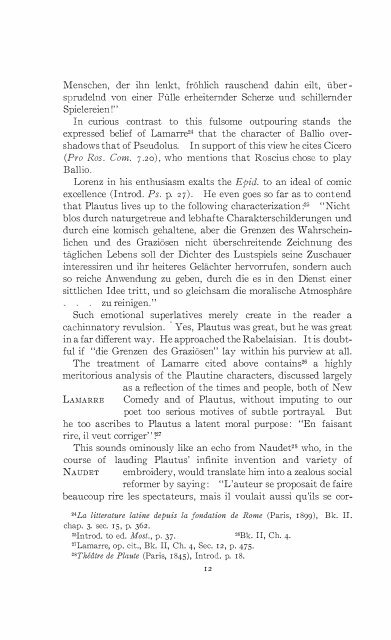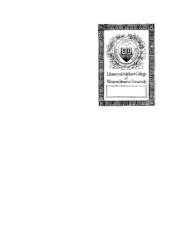You also want an ePaper? Increase the reach of your titles
YUMPU automatically turns print PDFs into web optimized ePapers that Google loves.
Menschen, der ihn lenkt, frohlich rauschend dahin eilt, uber <br />
sprudelnd von einer Fulle erheiternder Scherze und schi11ernder<br />
Spielereien!' ,<br />
In curious contrast to this fulsome outpouring stands the<br />
expressed belief of Lamarre24 that the character of Ballio overshadows<br />
that of Pseudolus. In support of this view he cites Cicero<br />
(Pro Ros. Com. 7.20), who mentions that Roscius chose to play<br />
Ballio.<br />
Lorenz in his enthusiasm exalts the Epid. to an ideal of comic<br />
excellence (Introd. Ps. p. 27). He even goes so far as to contend<br />
that Plautus lives up to the following characterization :25 "Nicht<br />
bIos durch naturgetreue and lebhafte Charakterschilderungen und<br />
durch eine komisch gehaltene, abel' die Grenzen des Wahrscheinlichen<br />
und des Graziosen nicht uberschreitende Zeichnung des<br />
taglichen Lebens so11 del' Dichter des Lustspiels seine Zuschauer<br />
interessiren und ihr heiteres Gelachter hervorrufen, sondern auch<br />
so reiche Anwendung zu geben, durch die es in den Dienst einer<br />
sittlichen Idee tritt, und so gleichsam die moralische Atmosphare<br />
zu reinigen."<br />
Such emotional superlatives merely create in the reader a<br />
cachinnatory revulsion . . ' Yes, Plautus was great, but he was great<br />
in a far different way. He approached the Rabelaisian. It is doubtful<br />
if "die Grenzen des Graziosen" lay within his purview at all.<br />
The treatment of Lamarre cited above contains26 a highly<br />
meritorious analysis of the Plautine characters, discussed largely<br />
as a reflection of the times and people, both of New<br />
LAMARRE Comedy and of Plautus, without imputing to our<br />
poet too serious motives of subtle portrayal. But<br />
he too ascribes to Plautus a latent moral purpose: "En faisant<br />
rire, il veut corriger" !27<br />
This sounds ominously like an echo from Naudet2S who, in the<br />
course of lauding Plautus' infinite invention and variety of<br />
NAUDET embroidery, would translate him into a zealous social<br />
reformer by saying: "L'auteur se proposait de faire<br />
beaucoup rire les spectateurs, mais il voulait aussi qu'ils se cor-<br />
'4La litterature latine depuis la fondation de Rome (Paris, 1899), Bk. II.<br />
chap. 3· sec. IS, p. 362.<br />
"Introd. to ed. l11ost., p. 37. 26Bk. II, Ch. 4.<br />
27Lamarre, op. cit., Bk. II, Ch. 4, Sec. 12 , p. 475·<br />
28Theatre de Plaute (Paris, 1845), Introd. p. 18.<br />
12
















